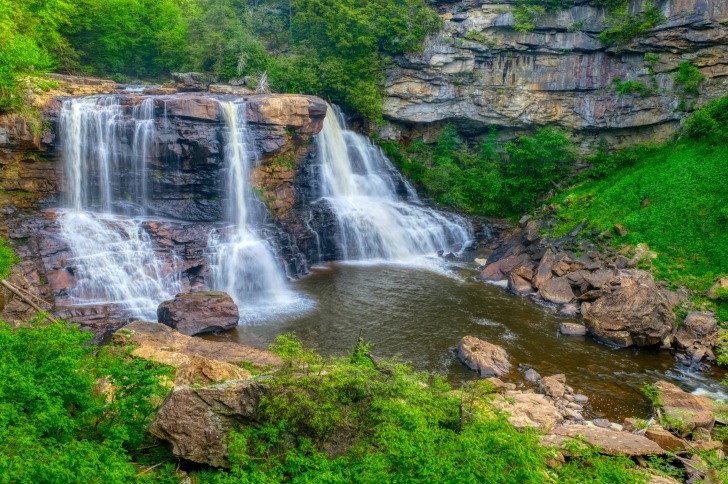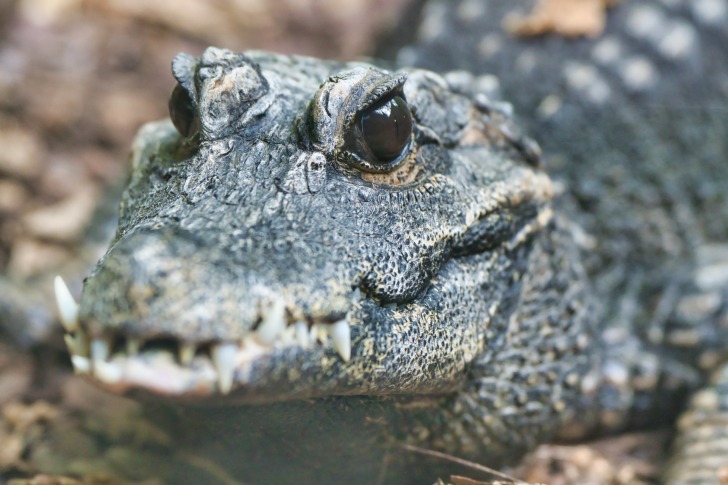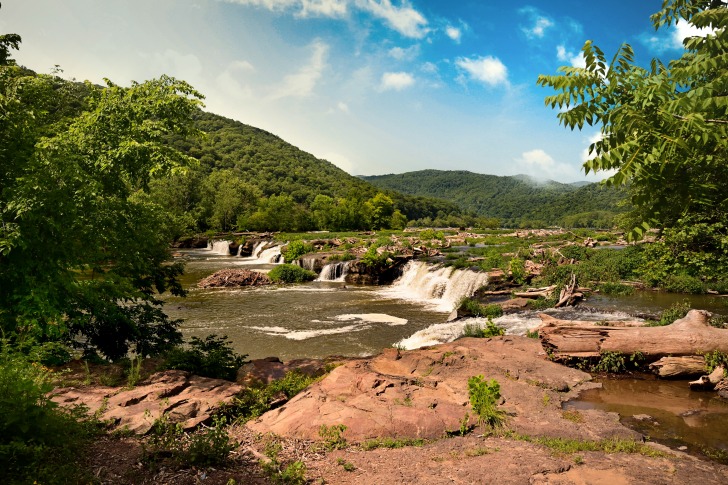The West Virginia Metro News reported an alligator sighting in 2010.
It occurred in the Upper Mud River Reservoir, but why would it be here?
I thought only 10 states total had gators in them.
Contents
- So… Are There Alligators in West Virginia?
- Alligator Species in West Virginia
- States Where Alligators Come From
- Is it Safe to Swim in West Virginia?
- Places Where You Can Swim
- Interesting Alligator Facts in West Virginia
- Some Actual West Virginia Alligator Facts (Sort of)
- Alligators vs. Crocodiles
- 3 Safety Tips for Swimming in Alligator-Infested Waters
- Summary
- West Virginia Safety Overview
- Frequently Asked Questions
So… Are There Alligators in West Virginia?
Concerning the 2010 WV alligator sighting, DNR Fisheries Biologist Zack Brown says they received two separate reports about it.
Both witnesses estimated the creature to be more than five feet long, which turned out to be how long this large reptile was.
I don’t understand why they had to end this alligator’s life, however.
That’s just what the authorities sometimes feel is best if they find one roaming around — unfortunately.
I’m surprised trappers didn’t transport it to a refuge and maybe train it to get along with other animals, but that is what it is.
Sometimes, it’s for safety reasons, such as if they don’t know where it came from and what kinds of diseases it could have.
Of course, they want to make sure roaming alligators don’t endanger humans or domestic pets.
It’s sad though.
The good news is, trappers did make plans to save the life of an alligator found on West Virginia Road in 2019.
A group from Charleston, WV said they would transfer it to South Carolina where more alligators live.

Alligator Species in West Virginia
I see no evidence of any alligator species native to West Virginia.
In the case where one is found, it’s often because someone either released it into the wild after it grew into an adult.
This sometimes happens when the baby reptile matures, and the owners can’t handle it.
In some cases, alligators may escape from an owner’s residence unbeknownst to their “parent or guardian.”
Alligators on the loose in WV also could indicate a legal issue, whereas, in 2022, 13 News reports that keeping this creature as a pet is prohibited.
States Where Alligators Come From
The only alligator found in the United States is the American Alligator.
The closest of the 10 states from West Virginia where alligators are found include North and South Carolina and Georgia.
An alligator usually only moves about a maximum of 1.9 miles (3.2 km) in a day.
However, it’s possible for alligators to travel to WV from another state.
It maybe could eventually have made its way from Florida, which has the second-highest gator population in the country.
Interstate alligator travel does happen.
However, at only about 1.9 miles (3.2kilometers) per day, you can only imagine how long it would take them to move to another state.
I estimated about 348 miles from North Carolina and 421 miles from South Carolina to West Virginia.
Then, I divided both “348” and “421” by “1.9” (“1.9” is for how many miles per day maximum.)
I made my calculations.
Then, I concluded that it would take an alligator approximately 183-222 days to walk to WV from NC or SC.
That’s more than half a year.
However, I also did find out an alligator can run up to 35 mph, so if they’re in a hurry, maybe it would take them less time to reach a different state.
Is it Safe to Swim in West Virginia?
Concerning alligators, you may want to look up reports of their sightings.
Then, avoid those locations for swimming, fishing, boating, water skiing, etc.
You probably should concern yourself more with local water quality than whether you will confront an alligator or not though.
Municipalities issue their own reports about rivers, lakes, streams, and beaches, depending on how inhabited the area is.
Concerning water quality, watch out for updates about the bacterium, viruses, and parasite levels.
You also might see in the news information about where pollution dumps have occurred and avoid those waters.
If an area is “closed,” most locations will report that.
If they don’t, there’s usually a “no swimming” sign.
Other possible West Virginia water dangers include flooding, heavy rainstorms, and ice jamming.
They don’t have as much of a risk of tropical storms because they’re not located next to the ocean or gulf coasts.
Tornadoes are also rare here.
Still, prepare just in case.
Places Where You Can Swim
When weather and water quality permit, some of the best places to swim in West Virginia are Meadow Branch of Sleepy Creek and Glade Creek.
There’s also the Cacapon Resort State Park and Bethel, Yorktown or Jamestown, and Summersville Lake beaches.

Interesting Alligator Facts in West Virginia
On April 4, 2017, Ace Adventure Resort announced that the American Alligator is now introduced to the New River George.
That was just an April Fool’s Day prank though.
They did a convincing post though on the home page of their site, stating that adding this large reptile would “diversify our habitat.”
If I hadn’t seen the “Happy April Fool’s” message at the top of the page, I would have believed it.
I almost did, and that’s what made me want to check out this site in the first place.
We have to have a sense of humor, I guess.
Some Actual West Virginia Alligator Facts (Sort of)
The most important fact to remember is that alligator sighting are apparently rare here.
However, there’s some talk of alligators moving north because of climate change.
I presume Jackson Landers, a Slate reporter who made this forecast in 2013, is referring to global warming.
If so, that makes sense to me because I learned that alligators prefer warmer habitats even if they can survive in a frozen lake if they have to.
When you think about it, it could be true.
As of 2022, World Population Review does show the presence of alligators in Virginia already.
That’s only one state east of WV.
I don’t see why they might not migrate from other locations, including the NC and SC that I mentioned.
If some become born in WV, then, they’d technically be the first natives of this species.
Alligators vs. Crocodiles
Alligators and crocodiles have so many similarities that it’s hard to tell them apart at a distance – and I wouldn’t suggest walking up close to them in person!
Don’t unless you’re a licensed researcher and have the proper PPE.
Anyway, alligators have a rounded, wider snout versus the longer, pointier one that the American Crocodile has.
Another type of “crocodilia” order creature called the “caiman” has an olive-brown color similar to a crocodile, which can make it more confusing to tell them apart.
You can tell it’s a caiman if it’s smaller than an alligator or crocodile though.
If you want to know if it’s an alligator instead of either a caiman or a crocodile, notice the darker, gray-black colors. Alligators do have a light underside though.
Alligators don’t weigh quite as much as a crocodile does.
The adult male will maybe put on an average of 500 to 600 pounds.
The crocodile sometimes pushes an average weight that’s twice this.
The maximum heaviness is about 1,000 pounds for an alligator and 2,000 pounds for a crocodile.
Usually, a crocodile will show more of its teeth when it “smiles.”
That’s because the top and bottom jaw lines of a crocodile are about the same size.
Not all the teeth will fit in a croc’s mouth when closing it.
Only portions of South Florida have both the American Crocodile and the American Alligator.
In the rest of the states where alligators originate, you won’t find any crocodiles.
That is, you won’t come across any unless they trek from the Gulf of Mexico or the Caribbean Sea.
As far as where alligators vs crocodiles live, alligators prefer freshwater.
In fact, they can’t handle salt water for more than a few hours or for a maximum of a few days.
3 Safety Tips for Swimming in Alligator-Infested Waters
1. If you know, don’t go.
If you know that alligators would show up in West Virginia waters, don’t go there.
You probably won’t have to worry about that unless you see a report about it on the news though.
Otherwise, if you see a sign that says not to swim, don’t swim there.
2. Don’t swim alone.
I don’t recommend swimming alone anywhere, except maybe in your own bathtub or pool.
It’s even more challenging to swim in unfamiliar areas.
You shouldn’t risk it, but that doesn’t just apply to the possibility of alligators.
This area does have some sharks, and you might encounter dangerous forest animals hanging out near freshwater areas.
All in all, your highest priority would be making sure you find water to swim in that has the lowest contamination levels.
3. Pay attention to flood or storm warnings.
West Virginia tornado and tropical storm risk are low.
However, you don’t want to be stuck out in the water during a heavy rainstorm or swimming in a meadow during a flood.
If you’re in an area prone to flooding and you can’t get out, take cover the best you can.
I’d be praying hard, personally, at this point.
Summary
West Virginia has some interesting alligator stories to tell.
However, actual sightings are rare.
West Virginia Safety Overview
READ THE FULL REPORT: West Virginia Safety Review
Safety Index:
- OVERALL RISK: MEDIUM
- TRANSPORT & TAXIS RISK: LOW
- PICKPOCKETS RISK: MEDIUM
- NATURAL DISASTERS RISK: MEDIUM
- MUGGING RISK: MEDIUM
- TERRORISM RISK: LOW
- SCAMS RISK: MEDIUM
- WOMEN TRAVELERS RISK: HIGH
Frequently Asked Questions
How many people in West Virginia die from alligator attacks?
None that I know of have occurred in WV since the 1970s.
Only an average of one fatal alligator attack happens per year.
What happened to all the alligators?
Many states never had them in the first place because they prefer warm weather.
However, hunting practices have caused them to become endangered, and now they’re covered under the Endangered Species Act.
How many alligators does West Virginia have?
West Virginia doesn’t have any of its own alligators.
They did, however, live one state over in Virginia.
They used to inhabit the Great Dismal Swamp until the 1900s.
Then, they migrated to Florida.
Where do alligators normally live?
Alligators normally live in ponds, marshes, lakes, rivers, and other shallow-water areas.
They can’t tolerate saltwater like a crocodile, so you won’t find them in the ocean much.
What do I do if I see an alligator in West Virginia?
Don’t try to play with it or provoke it.
Don’t go near it.
Call local authorities, and they’ll deal with it.












It’s not likely that you’d come across an alligator in West Virginia, but it’s possible.
The best places to swim are the Cacapon Resort State Park and Bethel, Yorktown or Jamestown, and Summersville Lake beaches.
If you see a sign that says not to swim, don’t swim there.